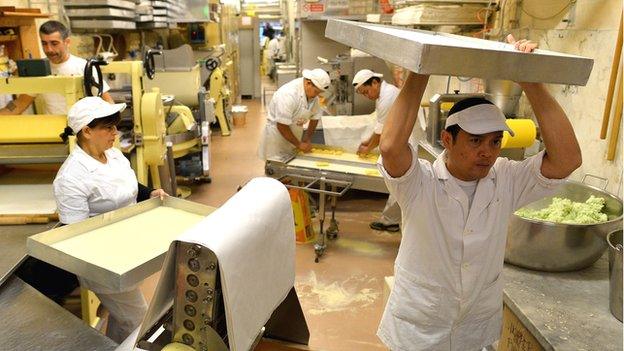Europe in 2014: Ghosts return
- Published
- comments
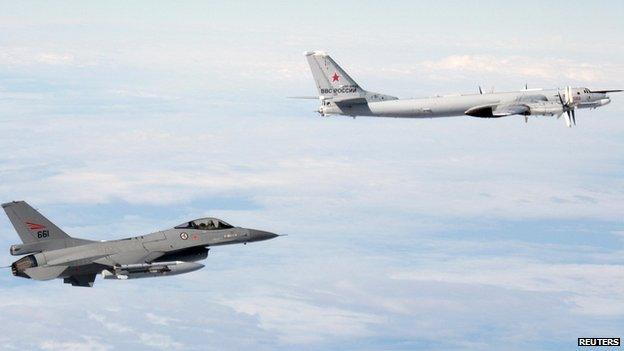
Cold War echo: A Norwegian fighter tracks a Russian Tu-95 Bear bomber
For Europe this has been the year when ghosts - long thought buried - returned.
For nearly 70 years Europe had held to a core principle: that borders could not be changed by force. In Crimea - and in eastern Ukraine - Russian President Vladimir Putin dusted down and revived older, more dangerous doctrines.
German Chancellor Angela Merkel warned against "old thinking in terms of spheres of influence in which international law is trampled on".
As the year draws to a close other images from another era make their reappearance: Russian Tu-95 Bear bombers being shadowed by Nato jets in European airspace. In one 24-hour period Russian military aircraft had to be intercepted 26 times.
It was the former Soviet leader Mikhail Gorbachev who said "the world is on the brink of a new Cold War" - words that would have been unimaginable a year ago.
Russia rethink
No one in Europe knows the extent of President Vladimir Putin's ambition, or how seriously he intends to revive the territory of "Novorossiya" or the former Soviet empire. In imperial Russia "Novorossiya" was a swathe of territory north of the Black Sea which later became part of Ukraine.
For reasons of history Germany is Russia's most important partner in Europe. Angela Merkel has spoken to Vladimir Putin more than 35 times. She is said to feel deceived and, despite intense lobbying from German industry, has backed sanctions against Russia.
Despite divisions - mainly caused by economic need - Europe adopted sanctions and found a public face of unity.
The crisis in Ukraine left Europe's leaders with many troubling challenges: the extent of Europe's dependency on Russian energy; the influence of Russian money in Europe; the cuts in defence budgets.
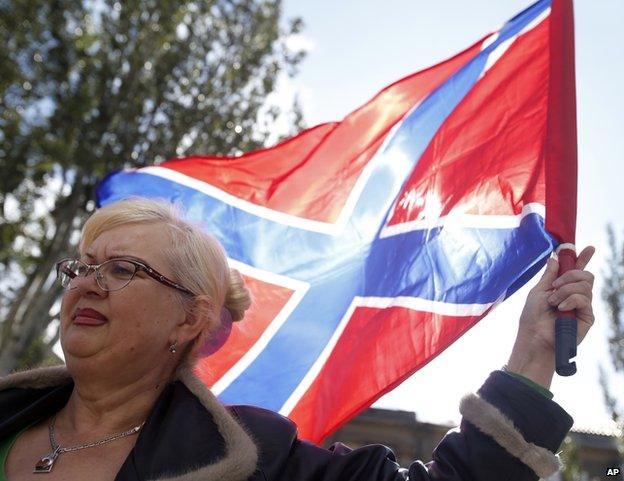
Supporters of the pro-Russian revolt in eastern Ukraine sport the Novorossiya flag
Ailing eurozone
The eurozone crisis had supposedly been buried in 2013. It, too, has staged a return. It is no longer principally a crisis about debt but stagnation, caused by a lack of demand. 2014 marked the limits to the policy of austerity.
As the year ends the eurozone is close to recession. Its economy grew by a modest 0.2% in the third quarter and risks sliding into deflation. The eurozone's three biggest economies saw manufacturing activity decline in November.
The threat is no longer of countries being unable to finance their debts due to high borrowing costs. That risk was essentially removed by the President of the European Central Bank (ECB) Mario Draghi in 2012, when he promised to do "whatever it takes" to defend the euro. Italy can currently borrow at 2%.
The new threat is a lack of growth and stubbornly high unemployment. There is a growing consensus that without economic recovery the debt burden will become unsustainable again. So Europe has changed its priorities. No longer is the emphasis on reducing deficits. Italy and France have been shown some flexibility over breaking EU budget rules.
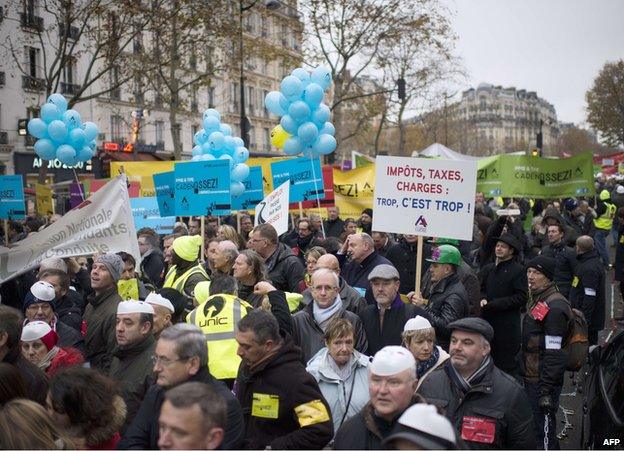
French businesses are demanding lower taxes and fewer regulations
Greek drama not over
Greece, which had for so long been the epicentre of the crisis, returned to rattle markets. It had seemed that the country was finally escaping six years of recession. Its economy shrank by 25%, which is unprecedented in the modern era in Europe. But in 2014 it found growth of 0.7% and even managed a budgetary surplus. Unemployment edged down to 25.7%.
However, political uncertainty has returned. A vote to decide on a new president could lead to elections in the New Year. If that happens, the favourite to win - according to the polls - is Alexis Tsipras, leader of the radical left party Syriza. "We will replace the EU/IMF bailout," he says, "from the initial days of our government". He wants some of Greece's debt restructured.
The prospect has unnerved officials in Brussels, to the point they are openly taking sides in the Greek crisis and delivering warnings. European Commission President Jean-Claude Juncker said: "I assume that the Greeks… know very well what a wrong election result would mean for Greece and the eurozone." The helm of the country, he said, could be taken over by "extreme forces".
2014 also saw a continued rise in anti-establishment parties, many of which were anti-EU. In France, Marine Le Pen's Front National won the European elections. In Britain UKIP came out on top.
In Italy, although Matteo Renzi scored an impressive victory at the polls, the second most popular leader currently is Matteo Salvini, the leader of the anti-immigration Northern League, who said recently "the Europe of today cannot be reformed, in my opinion". Even in Germany a Eurosceptic party, the AfD, has gained a political foothold.
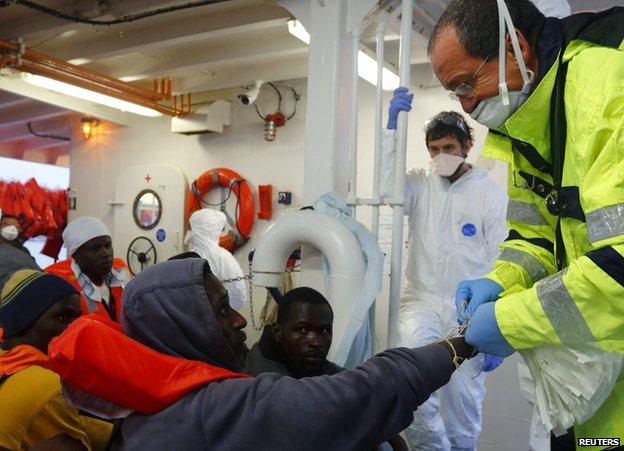
Italy has scaled back its migrant rescue mission at sea on cost grounds
Tension over migrants
For all the discontent, however, power in Europe - particularly in the European Parliament - remains firmly in the hands of the mainstream parties.
After unemployment and the economy, migration was confirmed as a major issue in many countries.
During the year 207,000 migrants arrived by boat in Italy. More than 3,400 died in the Mediterranean. Germany received more than 180,000 asylum applications. Sweden has operated an open-door policy for migrants from Syria, but it has caused political tension. The far-right Sweden Democrats have forced a snap election, which they hope will be a "referendum on immigration".
It may become significant that the rise in the number of refugees seeking asylum in Germany has sparked the emergence of a protest movement, part of which is linked to the far right. Every Monday evening recently thousands of people have marched through the city of Dresden carrying German flags and protesting against the "Islamisation" of their country. The protests have been condemned by Angela Merkel.
What we failed to give sufficient attention to:
The era of the insurgent party: not only is support for established parties weakening but new, often populist, parties can rise at astonishing speed. In Spain, Podemos - a radical left party - was only formed 10 months ago. It is already polling at 23% and could well be a player in next year's elections. This volatility could make it harder to form stable governments
The young: the true cost of the economic crisis fell on the shoulders of the young. Youth unemployment in Italy is still 43.3% and 70% of new hirings are on temporary contracts. In some countries the median pay of 22-29 year olds was 10% lower in 2014 than it was in 2006. The young see an older generation protected in their work, so denying them the chance to move up
The election of the new President of the European Commission, Jean-Claude Juncker: the process was complicated and not widely understood, but Mr Juncker frequently points out that he was elected. As he was the candidate of the party which gained the most votes in the European elections, it has shifted power towards the European Parliament.
In the UK that new European election process - known as "Spitzenkandidaten" ("lead candidates") - was largely ignored, and it came as a shock to David Cameron when German MPs and others told Downing Street that Angela Merkel would stand by Mr Juncker, having told voters to back him.
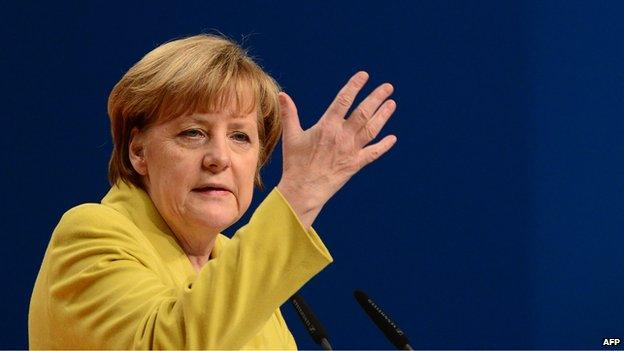
Chancellor Merkel still dominates German politics but she faces tough challenges in the EU
Who is up? Who is down?
Ms Merkel remains the most influential politician in Europe, yet she is more isolated than before. She still demands that Italy and France do more to rein in their budget deficits. The measures taken so far are "not sufficient", she says, but the tide is running strongly against austerity. Even with growth the priority in the eurozone, Germany is proudly running a break-even budget, the so-called "black zero".
France's President Francois Hollande saw his approval ratings drop to a record low of 13%. Unemployment remains stubbornly high. If it does not fall he may well not be a candidate in 2017.
"The French people would be merciless," he said, "and they would be right". Despite recent moves to free up the economy the French dilemma remains the same: how to reform labour laws which are seen as an integral part of the French way of life.
Matteo Renzi bristles with energy and confidence. He has pushed through political reforms and is in the process of introducing a Jobs Act to make it easier to hire and fire workers. Italy, however, remains in recession with debts of €2tn (£1.6tn; $2.5tn) and is the major concern for Europe's leaders.
Six months ago Mr Renzi said that "if Europe was to take a selfie today, it would be a tired, resigned image".
And David Cameron? 2014 was the year when Europe's leaders and officials began engaging with the possibility that after a referendum the UK could leave the EU. There have been many comments about desiring the UK to stay, but there is little appetite to make major concessions or to weaken any of the EU's core principles.
What Brussels will be keen to find out after the UK election in May is precisely what the UK is demanding. (More about Britain and Europe in my next blog.)
In 2014 Europe glimpsed its vulnerabilities: a resurgent Russia; its dependency on Russian energy; large-scale migration; its reliance on soft power in a neighbourhood where others do not recoil from using hard power; its inability to revive a stagnating economy.
The outgoing President of the European Council, Herman Van Rompuy, was clear: "without jobs and growth, the European idea itself is at risk".
Everyone is looking to the ECB's Mario Draghi to kick-start the European economy in the New Year by buying sovereign bonds.
Before the end of the year I will return to Mr Draghi and what 2015 holds for Europe.
- Published4 December 2014
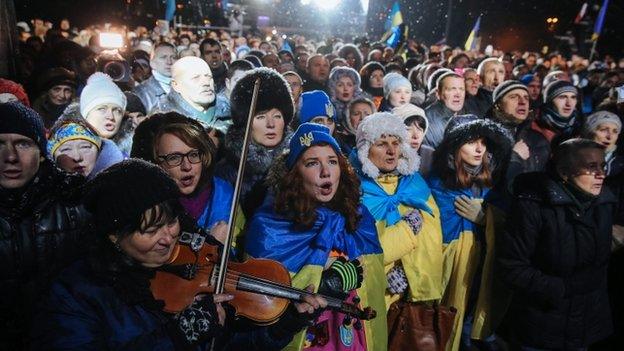
- Published28 November 2014
- Published12 December 2014
